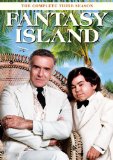| Reviews & Columns |
|
Reviews DVD TV on DVD Blu-ray 4K UHD International DVDs In Theaters Reviews by Studio Video Games Features Collector Series DVDs Easter Egg Database Interviews DVD Talk Radio Feature Articles Columns Anime Talk DVD Savant Horror DVDs The M.O.D. Squad Art House HD Talk Silent DVD
|
DVD Talk Forum |
|
|
| Resources |
|
DVD Price Search Customer Service #'s RCE Info Links |
|
Columns
|
|
|
Fantasy Island: The Complete Third Season
"Da plaaaaane! Da plaaaaane!"
"My dear guests, I am your host, Mr. Roarke. Welcome...to Fantasy Island!"
As Eugene Levy of The Ricardo Montalbán School of Acting would say: "Jeeeesssssss!" Shout! Factory, salvaging another potentially lost television series from "Underwhelming Sales" oblivion, has released Fantasy Island: The Complete Third Season, a 6-disc, 23-episode collection of the hit ABC drama's 1979-1980 season. Starring Ricardo Montalbán and Hervé Villechaize, Fantasy Island is one of those can't-miss series that "television critics" (yeech) love to hate, and unconcerned viewers wholeheartedly embrace. "Escapist entertainment" in the very best sense of the term, Fantasy Island scores as a semi-goofy (and unexpectedly touching at times, believe it or not) example of the Spelling-Goldberg stunt casting model, married to the traditional TV drama anthology format...with a little bit of Twilight Zone paranormality thrown in to broaden the genre sampling. No extras for these good-looking transfers.
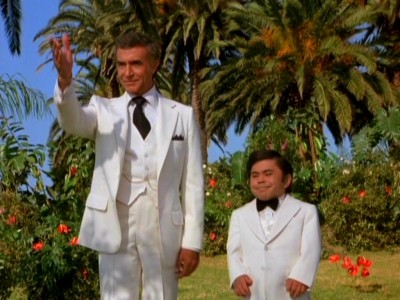
A lush, tropical island, somewhere deep in the Pacific Ocean. As the white prop Grumman Widgeon lazily arcs over the spectacular island mountain range, a solitary, crystalline ringing of a bell can be hear across the jungle, as little Tattoo (Hervé Villechaize) enthusiastically calls out, "Da plaaaaane! Da plaaaaane!" Resplendently attired Mr. Roarke (Ricardo Montalbán), the owner and operator of "Fantasy Island," thoughtfully looks skyward out the window of his office, located in a gingerbread Victorian/island-themed folly, before briefly bantering with his minor major domo Tattoo. Mr. Roarke's guests have arrived. Each week, two sets of guests fly to "Fantasy Island," having paid a considerable sum of money (which is almost never mentioned and which is never seen exchanging hands) to have their most private, most cherished, most fevered fantasies come true at the hands of the mystical, supernaturally-powered Mr. Roarke, who, although he professes to never judge, does his best to guide the guest to a more morally uplifting conclusion to the fantasies. Sometimes their fantasies are light and amusing, sometimes dark and deadly...but always, always populated by second-or-even-third-tier performers on their way down their career ladders.
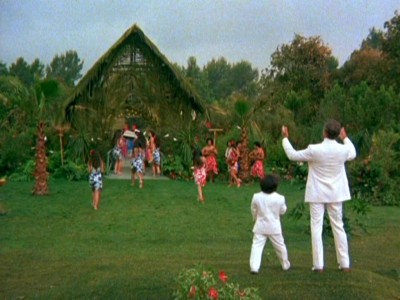
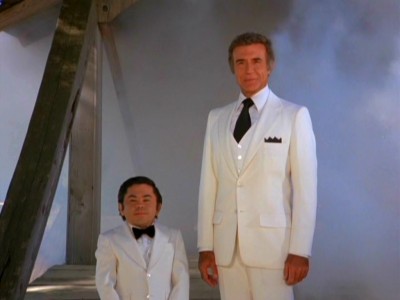
This is the opening to a review I wrote years ago for another classic Spelling-Goldberg production, The Love Boat (Fantasy Island's Saturday night lead-in), and I think it's entirely appropriate for the beginning of our look at Fantasy Island:
"The Love Boat is, in my humble opinion, one of the three or four classic litmus tests for whether or not you truly love TV. Now I'm not just talking about "liking" TV. We all like TV, whether we admit it or not. And we all watch it, despite those few poor liars we work with or know who sniff, "I never watch TV." No, I'm talking about loving TV, as in, "I was born and raised on endless hours of absolute junk crammed into my head from the earliest possible age...and I don't want it to stop" kind of loving. Some of TV is good, or even great; a very small portion of it you could even call "art" (whatever that is). But an awful lot of it is puerile swill, and you have to love that―faults and all―before you can say you truly love the medium of TV as a whole. Now obviously, I'm making a point here. I don't think for a second that The Love Boat is "puerile swill"―not at all. In fact, I think it's light and fluffy, and rather charming in its openly calculated, commercial way. But most "TV critics" in 1977 certainly hated it, and over the years, the words "The Love Boat" have become an easy, convenient way for people who haven't seen the series to take a cheap shot when comparing other shows thought to be similarly brainless or trivial. But I take my stand and say, "Nay!" There are quite a few pleasures to be derived from The Love Boat, particularly in the earlier seasons, and just as importantly, The Love Boat gave a lot of pleasure to millions and millions of fans who responded to its silly premise and its sunny, innocent, sweet-natured attitude. And I'll take that aim any day over TV that deliberately offends, or shocks, or titillates, or exploits, in the specious pursuit of faux-gritty, spuriously real, bogus "art."
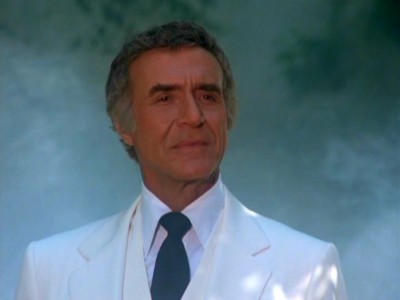
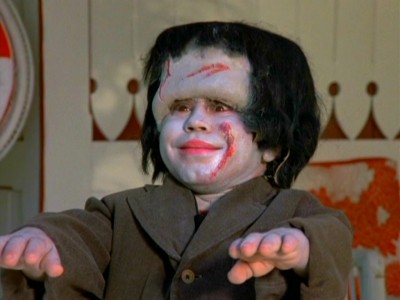
Ditto for Fantasy Island.
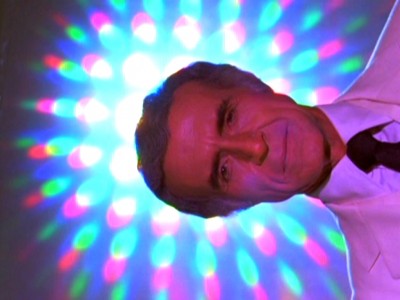
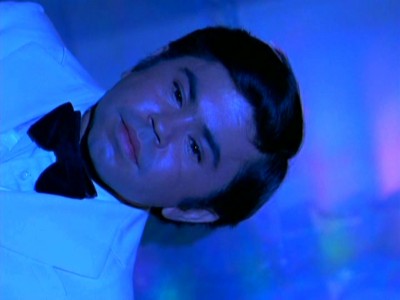
I haven't seen an episode of Fantasy Island in years and years, but it was a favorite of mine growing up, particularly in that classic one-two Spelling-Goldberg programming punch with The Love Boat on ABC's Saturday night. "Escapist entertainment" in its most literal sense, Fantasy Island only wanted to take the viewer away from their own problems for an hour...by showing those same problems condensed and glamorized and glossed over (and most importantly: neatly resolved by the end of the hour) as essayed by a host of familiar, comforting performers who posed zero threat to the viewers. With a super-smooth, almost mechanical production (and I don't mean that negatively), two highly charismatic leads (Villechaize funny and cute, and authoritative, quietly dramatic Montalbán appropriately silky and mysterious), and a highly-regimented "repeatable experience" quotient, Fantasy Island was a consistent "go to" series when you wanted to flake out for an hour and be simply entertained by the tube, week in and week out.
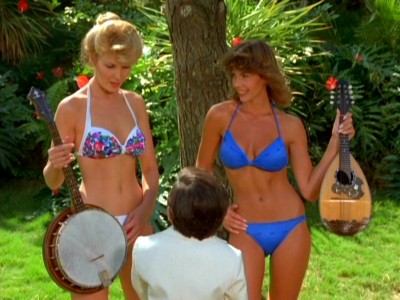
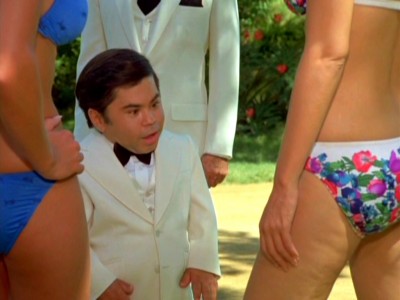
Watching the series again all these years later, what surprised me the most about it was how much of Fantasy Island incorporated supernatural/paranormal aspects to its basic framework. For whatever reasons, I seemed to have remembered Mr. Roarke's execution of the fantasies in a much more literal, physical fashion. I remembered the show as people coming to the island, having paid a lot of dough to get there, with Mr. Roarke recreating their fantasies by building them, as in engineering them, such as in this season's Eagleman segment: Bob Denver wants to impress his comic book-loving son, so he becomes "Eagleman," through the mechanical and engineering trickery of Mr. Roarke (bouncy boots, a mocked-up secret hideaway headquarters). However, quite a few, if not the majority of the fantasies presented here involve either vague or acknowledged "otherworldly" aspects to make them come true (time travel, alternate universes, and magical potions are the most frequently utilized)...if they're not outright extensions of Mr. Roarke's mysterious powers. Why I didn't remember that is beyond me, but I guess I shouldn't be surprised when one takes into account when Fantasy Island was produced: right at the tail end of that golden period of 70s hooey about Bigfoot, the Bermuda Triangle, pyramid power, and UFOs (Roarke even directly references the Triangle in Magnolia Blossoms, stating that through a "strange, geo-magnetic condition," guests of Fantasy Island can "occasionally" travel back in time, and even get stuck there...or can they?).
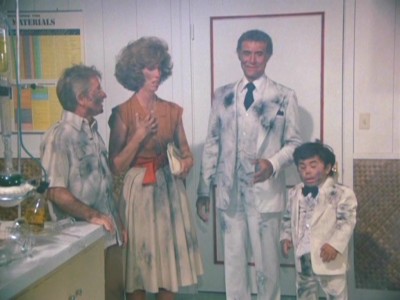
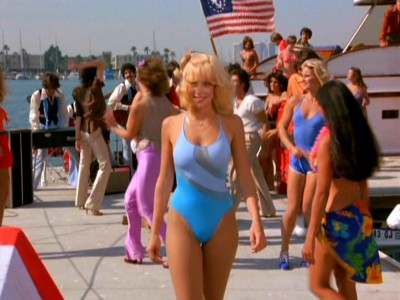
And despite carping from critics about the fuzziness of the actual workings of the fantasies, I found that aspect of the series the most intriguing. You never really knew what the set-up was on Fantasy Island, or how fantasies were actually worked out, or who, exactly, was Mr. Roarke. It always kept you guessing. Roarke may warn that time travel on Fantasy Island can be fickle or permanent or even fatal...but he sure seems to have mastered it, coming and going within his guests' fantasies with impeccable timing (just when they're ready to die, usually). So is it really time travel the guests are experiencing? Or alternate universes? Or are these fantasies just little playlettes from Mr. Roarke's imagination? He obviously is immortal (he speaks of knowing Cleopatra, battling ancient mermaids, and references a romance from over three hundred years ago this season), while he possess powers that bring him close to divinity (although the writers, mindful of a much more mainstream religious 1979 American, are always careful to stress he can't bring back the dead). In Rouges and Riches, Robert Goulet, a former guest, has continued on in his fantasy as a swashbuckler...so is he still paying Mr. Roarke? Or has he genuinely traveled back in time? What kind of "time" has he inhabited? Is it really located on the island, or is the island a portal to that particular place and time? Or is Roarke God, juggling all of these little dramas and comedies for his own amusement? Now...why in the world would I want that spelled out for me, as some critics would ding the series? Wouldn't that end the mystery and "pull" of the show the minute the producers made everything concrete?
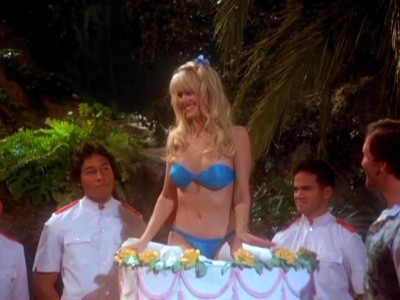
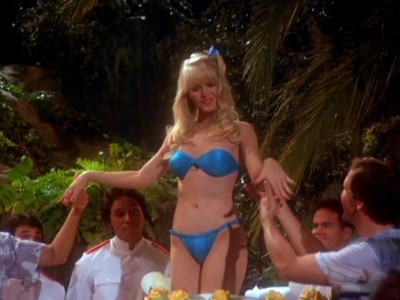
As for the storylines themselves, they may be obvious and predictable as far as their outcomes hash out, but they often tap into some fairly primal fears and fantasies of the viewers watching. Mindful of their core audience, the producers and writers of Fantasy Island always try and include some plucky tryers and losers from the Midwest for these little morality plays (to TV producers, "the Midwest" is everything inbetween Los Angeles and New York City, from Toledo to Sioux Falls to Wichita), where the characters are desperate to find resolution to some physical or emotional (and often financial) condition that only Mr. Roarke can settle once and for all. Paralyzed kids who won't walk again, blind cops who can't work, down-on-their-luck businessmen needing one last score, estranged fathers and sons who can't connect, loser singers who won't ever make it, dockworkers trying to go to night school, small-time secretaries looking for love and fulfillment, lonely people looking for something, anything to alleviate their pain―all of these characters show up on Fantasy Island. And most endearingly to the viewers (the viewers who see parts of themselves in those losers and damaged people), those characters are never made fun of on Fantasy Island. Mr. Roarke gravely listens to them (how many people in your life really listen to your fears and desires...and then actually does something about them?), and, even though he often knows their fantasies are misguided, grants them their wishes (and their dignity), before guiding them to greater understanding and happiness. What grandparent at home, watching Jeannette Nolan and Ike Eisenmann in the lovely On the Other Side, wouldn't want to hear their selfish, oblivious grandkids tell them how much they loved them, begging them to not cross over into heaven? A decidedly moral series at its core, without being preachy or denominational, Fantasy Island, even at the depths of its sometimes silliness, was able to reach a level of sweetness and sadness that's quite unexpected...particularly when all you ever hear is how "disposable" it is as television (the unusual one-guest The Wedding, with Samantha Eggar dying in Mr. Roarke's arms, is sensitively written, with Montalbán given the rare opportunity on this series to actually act...which he does exceedingly well).
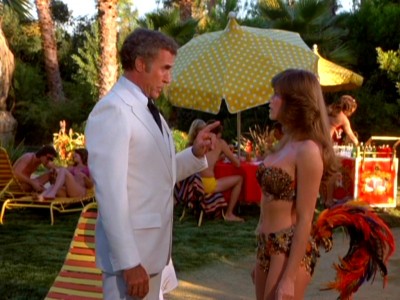
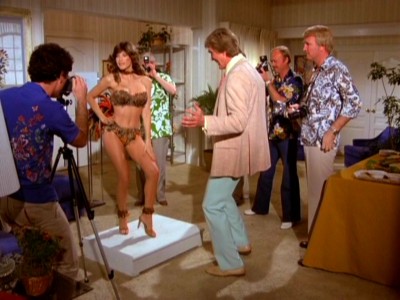
Certainly, though, you don't have to let Fantasy Island weigh heavily on you if you don't want to: you can just sit back and let some of its more ridiculous aspects wash pleasantly over you. Though frequently corny, I always enjoyed the Roarke/Tattoo comedy moments at the beginning of the episodes...although by the time the writers shamefully introduced Chester the Monkey into them, you see these little scenes gradually disappear, until a stock shot of Roarke coming out and merely bidding Tattoo "Good morning" graces most episodes (was this the producers' way of giving the reportedly difficult Villechaize a slap-down?). The then-vilified/now-celebrated Spelling-Goldberg model of matching up a smorgasbord of marginal and/or faded stars for contrasting effect will certainly entertain viewers like myself who live for these bizarre pop culture conflagrations. Where else but in a series like Fantasy Island do you get Father Knows Best's Paul Petersen romancing Playboy®'s Barbi Benton? Or Roddy McDowall and Donna Mills? Or Get Smart's Don Adams and James Bond's Martine Beswick? Or Sonny Bono with nun Shelley Fabares (from Elvis to Sonny in ten short years...)? Or Fred Williamson and Gary Collins (no, not romancing...boxing)? Or Jethro and Carol Lynley? Or George Maharis and Britt Ekland (she's Aphrodite...and he's got a permed rug that makes him look like the aborigine in that Bugs Bunny cartoon)? Or Don Stroud nailing not only classy Rosemary Forsythe but Marcia Brady, too? Or Lisa Hartman and Frankie Avalon? Or Misty Rowe and Keith Partridge? Or most delirious of all, Ernest T. Bass with Judy Landers? When you have an episode like One Million B.C. come out of the blue, where Jo Ann Pflug and Vega$'s Phyllis Davis (a funny actress with a jaw-dropping, impossible body) crack jokes before they shrug their shoulders and give themselves over to caveman Peter Lupus, complete with goofy Land of the Lost dinosaurs matted in...brother, what you have is perfection in the kind of delightful TV nonsense that television today is too self-conscious, too snottily self-aware, too self-important to bother with anymore. More's the pity.
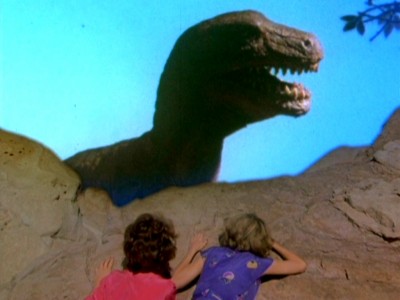
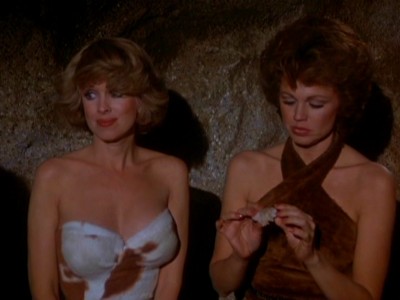
Pity the poor fans who tried to find Fantasy Island during premiere week in September. In a major miscalculation, ABC took the hit Fantasy Island (22nd most-watched show of the previous 1978-1979 season) out of its Saturday 10:00pm slot and pushed it back to Fridays at 8:00pm, leading in The ABC Friday Night Movie, with direct competition from the kid-friendly The Incredible Hulk on CBS. Ratings took a nose dive, and ABC hastily put Fantasy Island back in its regular Saturday night timeslot in October, but the damage was done. Despite zero competition from CBS's highly-touted flop, Paris, with James Earl Jones, and NBC's disastrous James Bond throwback, A Man Called Sloane with that annoying little pest Robert Conrad, Fantasy Island's ratings slipped overall to 28th for the year, proving once again that viewers get testy when networks move around their shows. A more accurate assessment would probably be that lead-in The Love Boat dropped significantly in the ratings this year, as well, pulling down Fantasy Island's ranking; in the upcoming 1980-1981 season, The Love Boat went through the ratings' roof...bringing Fantasy Island along for the ride.
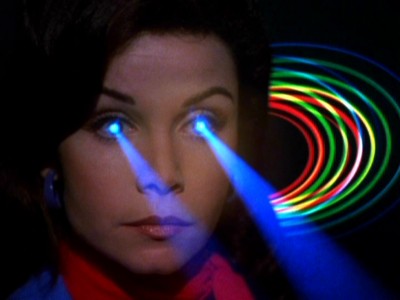
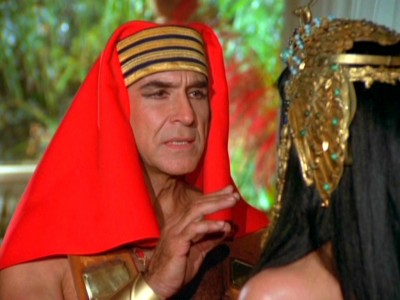
The DVD:
The Video:
The full-screen, 1.33:1 video transfers for Fantasy Island: The Complete Third Season look good, with solid color, a sharpish image...but way too much red jaggies for my liking. Rather surprising, that.
The Audio:
The Dolby Digital English mono audio track is fine, with no distortion and little if any hiss. English closed-captions are available.
The Extras:
No extras for Fantasy Island: The Complete Third Season.
Final Thoughts:
Perfect escapist fare, expertly produced. Superficial at times, surprisingly touching at others, and always hilariously funny (unintentionally, of course) whenever a mis-matched pair of celebrities co-star, Fantasy Island: The Complete Third Season is consistently entertaining. I'm highly recommending Fantasy Island: The Complete Third Season.
Paul Mavis is an internationally published film and television historian, a member of the Online Film Critics Society, and the author of The Espionage Filmography.


|
| Popular Reviews |
| Sponsored Links |
|
|
| Sponsored Links |
|
|
| Release List | Reviews | Shop | Newsletter | Forum | DVD Giveaways | Blu-Ray | Advertise |
|
Copyright 2024 DVDTalk.com All Rights Reserved. Legal Info, Privacy Policy, Terms of Use,
Manage Preferences,
Your Privacy Choices | |||||||









